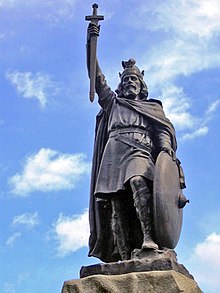Alfred of England
| Alfred the Great | |||||
|---|---|---|---|---|---|

Statue of Alfred the Great by Hamo Thornycroft in Winchester, unveiled during the millenary commemoration of Alfred's death.
|
|||||
| King of the Anglo-Saxons | |||||
| Reign | 23 April 871 – 26 October 899 | ||||
| Predecessor | Æthelred | ||||
| Successor | Edward the Elder | ||||
| Born | 849 Wantage, then in Berkshire, now Oxfordshire |
||||
| Died | 26 October 899 (around 50) Winchester | ||||
| Burial |
c. 1100 Hyde Abbey, Winchester, Hampshire, now lost |
||||
| Spouse | Ealhswith | ||||
| Issue |
Æthelflæd, Lady of the Mercians Edward, King of Wessex Æthelgifu, abbess of Shaftesbury Æthelweard of Wessex Ælfthryth, Countess of Flanders |
||||
|
|||||
| House | Wessex | ||||
| Father | Æthelwulf, King of Wessex | ||||
| Mother | Osburh | ||||
| Religion | Christianity | ||||
| Full name | |
|---|---|
| Ælfred of Wessex |
Alfred the Great (Old English: Ælfrēd,Ælfrǣd, "elf counsel" or "wise elf"; 849 – 26 October 899) was King of Wessex from 871 to 899.
Alfred was the youngest son of King Æthelwulf of Wessex. Taking the throne after the death of his brother Æthelred, Alfred spent several years dealing with Viking invasions. After a decisive victory in the Battle of Edington in 878 Alfred made an agreement with the Vikings, creating what was known as Danelaw in the North of England. Alfred also oversaw the conversion of the Viking leader, Guthrum.
Alfred successfully defended his kingdom against the Viking attempt at conquest, and by the time of his death had become the dominant ruler in England. He is one of only two English monarchs to be given the epithet "the Great", the other being the Scandinavian Cnut the Great. He was also the first King of the West Saxons to style himself "King of the Anglo-Saxons". Details of Alfred's life are described in a work by the 9th-century Welsh scholar and bishop Asser.
Alfred had a reputation as a learned and merciful man of a gracious and level-headed nature who encouraged education, proposing that primary education be conducted in English rather than Latin, and improved his kingdom's legal system, military structure, and his people's quality of life. In 2002 Alfred was ranked number 14 in the BBC's poll of the 100 Greatest Britons.
...
Wikipedia
